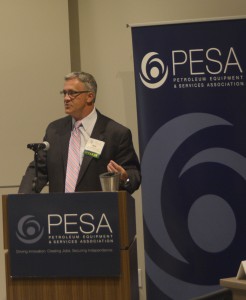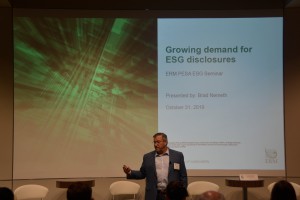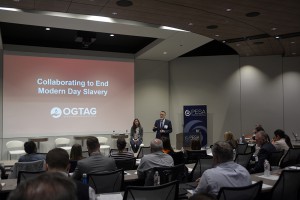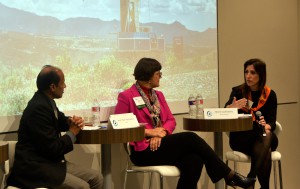The PESA ESG Committee held a seminar on October 31 that focused on several aspects of environmental, social and governance (ESG) and its importance to today’s oilfield services and equipment sector. The event, held at Schlumberger’s Harry Cameron Technology Center in Houston, included keynote speakers and panel discussions.
Keynote speaker Dr. Ken Medlock, James A. Baker, III, and Susan G. Baker Fellow in Energy and Resource Economics at the Baker Institute at Rice University, discussed global energy development and climate change.
He said that countries who are members of the Organization for Economic Co-Operation and Development (OECD), including the United States and those in western Europe, have historically driven energy demand, that group now only represents 1.3 billion of the 7.7 billon people on the planet. The demand pivot is centered on those areas where energy development is in its infancy, such as sub-Saharan Africa.
While Medlock acknowledged that climate change is a growing issue globally, he said current conversations on energy may vary depending on where the discussion is taking place. For instance, people in Norway are concerned about climate change, but residents of developing countries are focused on the establishment of basic energy infrastructure, which includes coal.
[su_quote cite=”Dr. Ken Medlock, Rice University”]“How energy is consumed is a conversation of the rich countries. While the wealthier countries are better positioned to solve energy consumption problems, those countries establishing energy sources are not going to wait for these solutions.” [/su_quote]
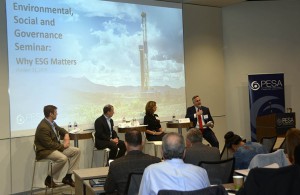
LEFT to RIGHT: Blake McCarthy, NOV; Jock Pool, Oceaneering: Valerie Banner, Exterran; Tim Tarpley, PESA
HOW TO DEVELOP AN ESG PROGRAM
The first panel gave attendees the opportunity to hear from executives who have developed ESG programs and ask questions about the process. Valerie Banner, Senior Vice President, General Counsel & Secretary, Exterran; Jock Pool, Chief Compliance Officer, Oceaneering; and Blake McCarthy, Vice President, Corporate Development and Investor Relations, NOV, explained why companies need to address ESG. The panel was moderated by PESA Vice President Government Affairs Tim Tarpley.
Panelists addressed the challenges small companies face when establishing an ESG program. From lack of employee bandwidth for compiling the information to pushback from executives, companies find this issue a challenge, but it is an effort that adds value to the company.
[su_quote cite=”Blake McCarthy, NOV”]“You are making smart decisions for the long term. It’s important to move the needle to see it as an opportunity.” [/su_quote]
They recommended companies take credit for actions already reported internally, such as HSE policies, human resource guidelines and procurement strategies. Even the smallest efforts can influence stakeholders and investors, or even prospective employees.
“Perception is reality,” Pool added. “Companies need to embrace it and make positive changes.”
Research is also key, according to the panel. Rating agencies such as SASB, GRI and ISS have frameworks available to help those in the beginning stages of an ESG program. Also, the panel suggested companies research what their competitors are reporting and be aware of the interests of stakeholders. All information should be easily available on the company website.
Banner suggested companies be proactive and develop relationships with stakeholders. “Doing all of this will make your company sustainable in the long run,” she said.
ESG SCORES AND HUMAN RIGHTS
A luncheon keynote was presented by Brad Nemeth, Consultant Director, ERM: Environmental Resources Management, who told attendees that ESG scores are a reality for all companies.
“Whether you want a score or not, you have one,” he said. “If you are publicly traded, you will have a score.”
According to Nemeth, the number of users of ESG data on Bloomberg has increased over 300% in the last seven years. The platform contains over 900 data points for 11,500 companies in 83 countries.
While areas such as environmental impacts, employee engagement and stakeholder expectations should be addressed, Nemeth said companies should make sure supply chain is not overlooked.
Also presenting during the luncheon was Alexandria Alvarez Gerbasi, Chief Administrative Officer, OVS Group, and David Reid, Chief Marketing Officer, NOV, representing OGTAG, the Oil and Gas Trafficking Advocacy Group. This coalition was established by Apache, ConocoPhillips, and Noble Energy to promote action by the oil and gas industry against human trafficking. According to Reid, between 25 and 40 million people globally are being trafficked today. This crisis is occurring in all 50 states, including more than 300,000 people in Texas.
OGTAG is working to move the oil and gas industry from issue awareness to action in ending human trafficking. Risks exist at large sports events and trade shows, as well as locations where there is an influx of travelers.
Alvarez Gerbasi encouraged employers to engage with OGTAG, train employees and suppliers to recognize the signs of a trafficked person, address supply chain risks, develop policies and join Texas Business Against Trafficking.
STAKEHOLDER VIEWS OF ESG
The second panel, moderated by Marie Caekebeke, Director Global Social Sustainability, Schlumberger, included Maria Dunn, Manager, Policy & Sustainability, Phillips 66, and Krish (Ravi) Ravishankar, Director – Worldwide Environmental Affairs, Oxy.
Dunn recommended companies begin by talking to business leads to identify key and primary stakeholders and communicate with them.
“Get stakeholder feedback. Investors really don’t understand our business. Even some employees don’t know the specifics. You must educate them,” Dunn said.
Ravishankar encouraged companies to view ESG as risk and opportunity. “Rating companies are a good guide,” he said, “but you have to find what are your real risks? What are your real opportunities? How do you set yourself apart?”
Recruiting young professionals is an increasingly difficult task, according to Ravishankar. He pointed out that the social investments of a company matter to younger generations.
[su_quote cite=”Ravi Ravishankar, Oxy”]“Students are willing to sacrifice benefits to work for socially conscious companies.” [/su_quote]
Dunn agreed and further advised that companies must communicate initiatives to employees.
“Young employees are getting pressure from friends and family for working in the oilfield,” Dunn said. “You have to talk to them. You have to know what sustainability looks like on the college campuses where they are coming from.”
A final piece of advice came from Caekebeke, who encouraged attendees to communicate with the rating agencies on the service their company provides at the well site.
“You need to educate the raters,” she said. “They typically don’t know the difference between the operators and the service companies.”
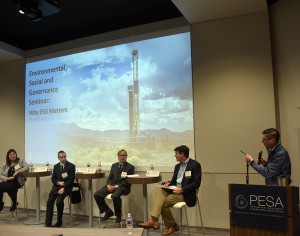
LEFT to RIGHT:Yvonne Fletcher, Solaris Oilfield Infrastructure; Pavel Molchanov, Raymond James; Michael Gray, ISS ESG; John Watson, Simmons Energy; John Daniel, Simmons Energy
INVESTORS AND ESG
The third panel was moderated by John Daniel, Managing Director and Senior Research Analyst and John Watson, Vice President – Research Analyst, Simmons Energy, a Division of Piper Jaffray.
The panel included Pavel Molchanov, Director, Clean Tech/Multinational Oil and Gas, Raymond James; Michael Gray, Vice President – Products, ISS ESG, and Yvonne Fletcher, Senior Vice President, Finance and Investor Relations, Solaris Oilfield Infrastructure.
Addressing ESG is vital for publicly-held companies according to Molchanov.
“Twenty six percent of all professionally managed assets are covered by some part of an ESG screen,” he said. “More than $11 trillion is tied to climate change.”
He encouraged companies to look at options to address environmental issues at the well site, such as efracs, replacing diesel with solar to power equipment, water management and carbon capture.
Fletcher believes that accidents in the industry affect ratings and investor opinion.
“Investors want to understand the risks,” she said.
She also stated that ESG should not dissuade a company from going public.
[su_quote cite=”Yvonne Fletcher, Solaris Oilfield Infrastructure”]“Some of the information needed doesn’t cost anything to implement. For instance, better labor relations, a more balanced board, anti-corruption policies, and participation in management by women. It’s not just your carbon footprint.” [/su_quote]
According to Gray, diversity is key.
“On governance, diversity is the most important thing,” he said. “Investors want more diversity and having a diverse director pool is important.”
He also advised companies to pay attention to employee safety and anti-corruption procedures.
“Public disclosures are important,” Gray said. “You need to ask the question, what are the issues for the company?”
Fletcher advised that private companies are addressing ESG to help gain business because some operators are looking for service companies with ESG programs.
“It’s not just about price anymore,” she said. “Having an ESG program could help win work.”
The PESA ESG Committee includes representation from Apergy, Baker Hughes, Covenant Testing Technologies, Exterran, Forged Products, Frank’s International, Halliburton, NOV, Oceaneering International, Oil States Energy Services, Schlumberger, Solaris Oilfield Infrastructure, and Tudor, Pickering, Holt & Co.



